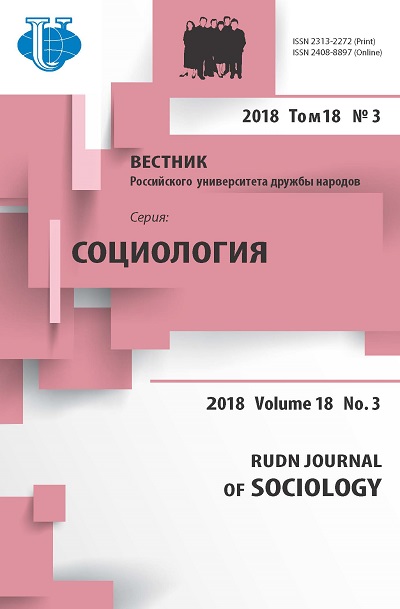CULTURAL MODEL OF THE RUSSIAN IDENTITY: AXIOLOGY, SEMANTICS AND COMMUNICATIVE POTENTIAL
- Authors: Onosov AA1, Gasparishvili AT1, Szafraniec K2
-
Affiliations:
- Lomonosov Moscow State University
- Nicolaus Copernicus University in Toruń
- Issue: Vol 18, No 3 (2018)
- Pages: 494-506
- Section: Surveys, experiments, case studies
- URL: https://journals.rudn.ru/sociology/article/view/19185
- DOI: https://doi.org/10.22363/2313-2272-2018-18-3-494-506
- ID: 19185
Cite item
Full Text
Abstract
The article presents empirical data of the project aimed at the study of the migration situation in Russia. The authors describe the current value system of the Russians and hierarchy of its basic life attitudes relying on both mass survey and expert estimates on the situation in Moscow and the Moscow Region. The article provides a sociological description of the content and levels of the system of values that are most important for the Russians; identifies its structuring function for the Russians’ mass consciousness. Before focusing on the identity of the Moscow Region’s natives (as it is perceived by the Russians), the authors consider the social-cultural situation in the metropolitan agglomeration. The quantitative sociological study relied on a wide set of criteria to study the identity, which included both the respondents’ value system and their personal life attitudes. The authors believe that the cultural model of Russian identity is capable of ensuring a broader and more diverse field of social relations for a peaceful and constructive ethnic interaction of the Russians with other nations than the ethnic model. However, the cultural model of Russian identity differs from the Western model of multicultural and multiconfessional society, which has already proved its inefficiency under the contemporary crisis conditions. The value landscape of the Moscow Region’s Russian population reflects both the necessity to preserve the Russian character’s traditional features and a desire for values of civil society. The sociological data allow authors to argue that today the ethnic identity of the Russians interacts with the strengthening civic identity on the basis of relevant values and ideas and goals that unite the nation. The article aims at better understanding of the Russians’ ethnic identity and of the communicative potential of the cultural model of identity.
About the authors
A A Onosov
Lomonosov Moscow State University
Author for correspondence.
Email: o.ksandr@yandex.ru
-
GSP-1, Leninskie Gory, Moscow, 119991, RussiaA T Gasparishvili
Lomonosov Moscow State University
Email: gasparishvili@yandex.ru
-
GSP-1, Leninskie Gory, Moscow, 119991, RussiaK Szafraniec
Nicolaus Copernicus University in Toruń
Email: krystyna.szafraniec@umk.pl
-
Fosa Staromiejska St., 1a, 87-100, Toruń, PolandReferences
- Dvernitsky B. Pravoslavie i samoidentifikatsija russkih v XXI veke [Orthodoxy and Russian identity in the 21st century]. http://ruskline.ru/analitika/2015/03/04/pravoslavie_ i_samoidentifikaciya_russkih_v_xxi_veke (In Russ.).
- Matveeva A.I. Duhovnaja socializatsija lichnosti kak sociokulturnaja osnova natsionalnoj bezopasnosti Rossii [Spiritual Socialization of Personality as a Social-Cultural Basis of Russia’s National Security]. Moscow; 2017 (In Russ.).
- Narbut N.P., Trotsuk I.V. Socialnoe samochuvstvie molodezhi postsocialisticheskih stran (na primere Rossii, Kazahstana i Chehii): sravnitelnyj analiz tsennostnyh orientatsij (Chast 1) [The social well-being of the post-socialist countries’ youth (on the example of Russia, Kazakhstan and Czech Republic): Comparative analysis of value orientations (Part 1)]. RUDN Journal of Sociology. 2018; 18 (1) (In Russ.).
- Nauchno-prakticheskaja konferentsija “Rossijskaja gosudarstvennost v XXI veke: natsionalnaja identichnost i istoricheskaja pamjat v uslovijah globalnoj konkurentsii” [Scientific-practical conference “Russian Statehood in the 21st Century: National Identity and Historical Memory in the Context of Global Competition”]. 2018. http://www.sociologos.ru/sobytiya_i_anonsy/ Nauchno-prakticheskaya_konferenciya _Rossijskaya_gosudarstvennost_v_xxi_veke_1 (In Russ.).
- Onosov A.A., Gasparishvili A.T. Izmerenija identichnosti russkih: sociologicheskie otsenki i gumanitarnaja ekspertiza [Measurement of the Russian identity: Sociological assesments and humanitarian expertise]. RUDN Journal of Sociology. 2016; 2 (In Russ.).
- Onosov A.A., Gasparishvili A.T. Etnizatsija massovogo soznanija russkih v Moskovskom regione: ekspertnaja otsenka processa [Ethnization of the collective consciousness of Russians in the Moscow Region: An expert assessment of the process]. RUDN Journal of Sociology. 2016; 3 (In Russ.).
- Polujahtova S.V., Tretjakova E.S. Natsionalno-kulturnaja identichnost rossijskoj molodezhi na rubezhe vekov [National-cultural identity of the Russian youth at the turn of the century]. Mezhdunarodnyj Zhurnal Socialnyh i Gumanitarnyh Nauk. 2016; 1 (1) (In Russ.).
- Rassadina T.A. Transformatsii traditsionnyh russkih tsennostej v nravstvennyh orientatsijah rossijan [Transformation of Traditional Russian Values in the Moral Attitudes of Russians]. Moscow; 2004 (In Russ.).
- Samoidentifikatsija russkogo naroda [Self-identification of the Russian people]. 2013. http://maxpark.com/community/13/content/2208004 (In Russ.).
- Sergeev A.L. Rossijskaja gosudarstvennost v XXI veke. Osnovnye problemy [The Russian Statehood in the 21st Century. Key Challenges]. Moscow; 2017 (In Russ.).
- Tsekhanskaja K.V. Globalizm i russkaja ideja: k probleme samoidentifikatsii russkogo etnosa [Globalism and the Russian idea: On the self-identification of the Russian ethnos]. Rossija: tendentsii i perspektivy razvitija: ezhegodnik. Moscow; 2013: 8 (II) (In Russ.).
- Sirgy M.J. The Psychology of Quality of Life. Kluver Academic Publishers; 2010.
Supplementary files













